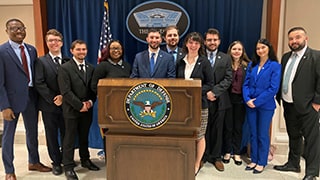FNA Assists National Security Fellowship in Developing Student and Industry Led Proof of Concept for the United States Department of State - Seton Hall University
Thursday, May 26, 2022

During this partnership, FNA and the NSF team developed an online widget that compared U.S. development loans, issued by USAID, and Pakistan's economic production across several sectors.
Over the course of the year, students from the NSF team workshopped and collaborated with experts from FNA. After each meeting, the students became more acquainted with how to choose data sets, run different statistical models, and how to interpret results. FNA and NSF students concluded that the best course of action would be to analyze open-source data published by the U.S. government and the United Nations to help prove the effectiveness of U.S. aid in Pakistan. Then, last month, the team presented the resulting study to the Department of State and Department of Defense in Washington, D.C. The study is titled: "Examining the Relationship between US Foreign Aid Spending and UN Defined Productivity Indices for Pakistan."
The project aimed to answer the question, "Given data about 18 years of financial
foreign aid spending in different categories provided to Pakistan, and productivity
indices (PCIs) for the same time period, could we establish a relationship between
the annual and total expenditures and the increase or decrease in PCI ratings?" The
results found very few statistically significant relationships, but of the few that
were observed, the spending had extremely limited yet positive impact on economic
production in Pakistan. FNA's partnership enhanced NSF’s presentation from past years
by providing an unprecedented statistical analysis along with the student's own research.
In summary, the modeling showed that for every $1million USD spent in foreign aid
spending, there were only statistically significant impacts on the changes in UN PCI
indices for three sectors (Structural Change, Energy, and Transportation), as shown
above. While the results are positive, the spending only incrementally improves the
PCI indices. The models controlled for the annual change in Pakistan’s gross domestic
product (GDP).
The study provides several questions for future research. For example, what other US DoS data could be used to identify impact on Pakistan outcomes of interest? Does DoS have their own dependent variables we could use to measure success / return on investment (ROI)? If no other variables for ROI are available, what considerations should be implemented given the lack of impact on expenditure on Pakistani productivity? Should we explore the same categorical relationships between additional similar or even non-similar countries to determine whether Pakistan is unique?
This research was presented as a compliment to the team's briefing, "Enhancing the U.S. Strategic Relationship with Pakistan: Recommendations for a Multifaceted Approach" not just in Washington, DC, but to USAID over a virtual conference. The NSF team is grateful to FNA for their support and hope to continue the partnership for future projects.
About FNA
FNA provides national security and policy professionals with machine learning enabled
network science solutions. FNA operationalises advanced data analytics, artificial
intelligence (AI) and machine learning (ML) techniques into production use cases.
Learn more here.
Categories: Education, Research






